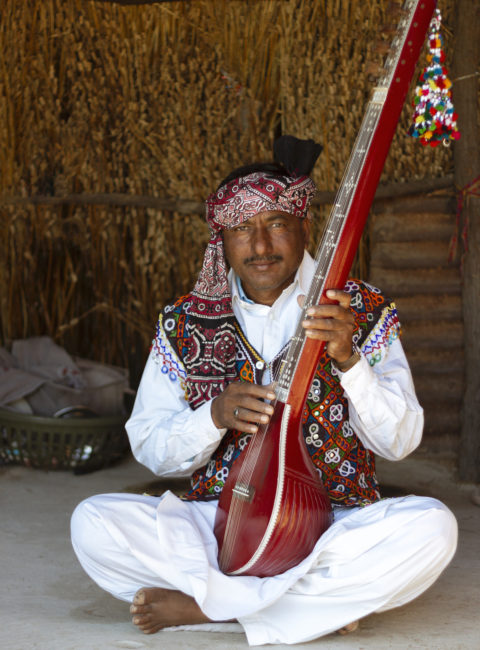
Artist: Nameribhai Parmar Folk instrument(s) : Santar. And also Dhol and Harmonium Vocals: Aaradhivani Village: Ratanpar, Khadir Bet, Kachchh.
“The poetry and music of Aaradhivani is in me”, says Nameribhai. Coming from a folk music family in Ratanpar village, Nameri embraced the traditions around him and found ways to bring new vocal expressions to his folk-art. While creating an identity that is unique to him.
“Aaradhivani has a very strong devotion to the beloved, the God” says Nameri. “I try to bring this raw emotion to my singing.” For the last 35 years Nameri seeks his devotion and worship to God through his ‘Vani’ (music).
Nameri is a 45 year old farmer and an award winning folk music artist. He makes a decent living through farming but hopes to devote full-time to ‘Aaradhivani’ in the near immediate future.
Nameri is also an accomplished Dhol player. In his early days Nameri became known as ‘Dholi’, for his skills with ‘Dhol’ instrument. Crowds delight and cherish Nameri’s presence to lead processions with Dhol in the local melas and festivals of Khadir region or to create an energised and vibrant rhythm of dance during festivals and ceremonies.
Kala Varso provided platform to Nameri with a monthly stipend to enable him spend time with his music and to practice and hone his skills and stage performances under a guru. Since 2012, Nameri has performed in nearly 20 folk concerts organised by Kala Varso. His performances garnered favourable local press and earned him the title ‘Bhagat’, a local honorific title for someone who is accomplished in his work.
“ગામ મા ગાતા પ્રસગું ોમા સામાજિક, ધાર્મિક પણ સ્ટેિ પર ગાવાની માજિતી ન િતી પછી કલા વારસો એ એમને તાલીમ આપી અને શીખવાડિય”
“We used to sing in our village in various social and religious events but had no knowledge about performing on stage, that knowledge Kala Varso provided us, trained and taught us”
Nameri picked ‘Aaradhivani’ from his father and grandfather. As a child Nameri spent many endless nights to hear elders perform ‘Reyans’ in his village. Picking up the words, diction and musical notes, imitating, practicing and bringing his own self into his renditions of Aaradhivani.
“But the ‘mahul’, environment, in which my children grew-up is in total contrast with my own childhood”, says Nameri. “The traditions took a decline. The local participation in traditional Reyans saw a steep fall in our region. It was not aspiring anymore to become a folk music artist.”
But Nameri sees a bright spark in the urgent need to nurture and educate young talent in Kachchh folk music. He took up a leading mentor role in Kala Varso’s folk music project with the school in Khadir region. The project introduces folk music of Kachchh into the school’s curriculum. In a first for Kachchh folk music, the school hired Nameri as part of the faculty.
This engagement is already freeing up possibilities with Kachchh folk music revival that didn’t occur in development programs conceived earlier.
On his personal journey though, situation has been grim in the last two years. The invitations to perform dipped. And the pandemic last year (2020) wiped away any chance to perform. It is not sustainable to depend solely on folk music.
In parting, Nameri adds, that he embraces this uncertainty but also wants to fulfil his insatiable search for meaning and music in the mystic poetry of Aaradhivani.